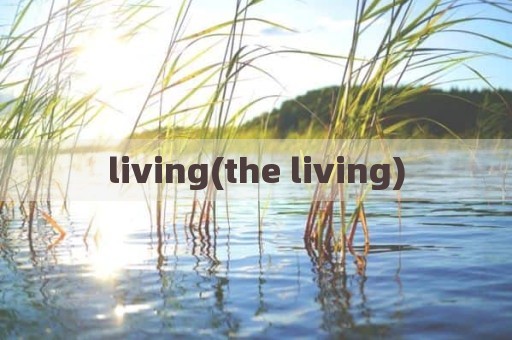大家好,living相信很多的网友都不是很明白,包括the living也是一样,不过没有关系,接下来就来为大家分享关于living和the living的一些知识点,大家可以关注收藏,免得下次来找不到哦,下面我们开始吧!
本文目录
live和living有什么区别
一、读音不同
living:英 [ˈlɪvɪŋ]美 [ˈlɪvɪŋ]
live:英 [lɪv]美 [lɪv]
二、充当的成分不完全相同
live做形容词时,表示“现场的;活着的”,可以做前置定语;living表示“活着的”,可以作表语或前置定语。
三、侧重点不同
living其反义词为dead,指包括人和动植物的生命没有消失、仍然存在的状态。
The living are more important to us than the dead.
对我们来说在世的人比去世的人更重要。
live通常作定语,指活生生的,生气勃勃的,还可表示现场直播的。
My grandfather is still living, but my grandmother is dead.
我的祖父还活着,可是祖母已经去世了。
扩展资料
同义词:
一、alive
英 [əˈlaɪv]美 [əˈlaɪv]
adj.活着的;活泼的;有生气的;敏感的
1、Doctors kept the baby alive for six weeks.
医生使婴儿活了六周。

2、I was glad to hear you're alive and well.
听说你健在我很高兴。
二、in life
英 [in laif]美 [ɪn laɪf]
一生中,世间,活着的
1、No peace, no rest for me in death, because I was never good or kind in life!
没有安宁,死了也不得休息,因为我活着的时候从来没有行善积德!
2、You can't get bits of somebody's brain in life.
你不可能获得某人活着的大脑的一部分。
alive和living的区别
alive,living的用法区别
这两个词都表示“活着的”、“有生命的”(having life)意思,词义相同,但用法有所不同。
一、Alive是表语形容词,放在to be,及其它联系动词之后作表语用,不能放在它所说明的名词之前。活跃的,“活着的”、“有生命的”;仍然存在的;仍然进行着的;继续活动的,继续有效的;运行中的;例如
The old man is still alive.老人还活着。
The fish we caught is still alive.我们捉的鱼还活着。
In most cases, both parents were still alive and still married to each other.大多数情况下,他们的父母都还活着,而且仍然保持着婚姻关系。
Although old, she is still very much alive.她虽已年迈,但仍很活跃。
The argument was kept alive by the politicians.政治家们还在继续争论那件事。
The fish we caught is still alive.我们所捕的鱼还活着。
He is alive with enthusiasm.他热情奋发。
The news of victory kept us alive in excitement.胜利的消息使我们兴奋。
The lake was alive with fish.这湖中有很多鱼。
二、Living既可用作表语形容词,又可用作定语形容词,故可放在它所修饰的名词之前。
我们既可以说:
English is a living language.
Is his father still living?
Shelly was still living when Keats died.济慈死时,雪莱还在世。
就使用场合而言,alive大都用于人,有时用作比喻或强调时也用于物。例如:
Given the chance to sing on stage,he is very much alive.有机会在台上唱歌,他显得很活跃。
The bazaar was all alive by the time we arrived.我们到达时,墟市非常热闹。
Living则人物共用。
就词性而言,alive只能用作形容词,不能作名词;living既可作形容词,又可作名词。例:
Many people were burnt alive in the conflagration that happened in a multi-storeyed building.在一幢多层大厦内发生的大火中,很多人被活活烧死。
The spy was caught alive though he died from wounds the next day.特务被活捉,不过第二天便因重伤而死。
Our living standards are rising steadily.我们的生活水平在不断提高。
Those who enjoy a good living seldom understand the suffering of the poor.过着美好生活的人一般都不明白穷人所受之苦。
在某些场合下,living和alive表示的涵义并不相同,尽管它们都用作表语。例如:
At last we found him in a trap in the forest,still living but not alive.
通过对比,可以看出,living之意是“活的”;alive之意是“有气息的”。这里的not alive表示人虽然还活着,但已“气息奄奄”、“没有生气”了。
Alive有时尚可表示“alert”“感觉到的”、“敏感的”涵义。如:
He is alive to the imminent danger.
他感觉到那迫在眉睫的危险。
living是什么意思
living的意思是活着的;谋生等。
1、living发音:英 [ˈlɪvɪŋ],美 [ˈlɪvɪŋ]。
2、词性:做形容词时,意思是活着的;活的;在使用的;在实施的;作名词时意思是生计;谋生;收入;生活方式;活着的人;作动词时意思是住;居住;生存;活着;(尤指在某时期)活着,是live的现在分词。
3、常见搭配:be living proof of sth/that…:(用行动或品格)证明…属实;within/in living memory,在仍活着的人们的记忆中;记忆犹新;earn sb's living,谋生。
4、 living的常见例句有:
Fathernevertalkedaboutwhathedidforaliving.父亲从不谈他的谋生之道。
Thespaciouslivingquarterswereonthesecondfloor.宽敞的生活区位于3楼。
Heearnshislivingdoingallkindsofthings.他做各种各样的活计来谋生。
扩展资料
living的近义词及其用法如下:
1、animate adj. [正式]有生命的,有生气的,指相对石头、机器等无生命体而言的。
〔例证〕The tiger lay so still that it scarcely seemed animate.那只老虎躺着一动不动,简直不像活的。
2、livelihood n.生计,谋生,指赖以为生的手段,通常依靠某种职业。
〔例证〕Playing in a band is my livelihood.在乐队里演奏是我的谋生之道。
3、alive adj.活着的,指相对死亡而言的,通常作表语,且不可用 very修饰,应用 much或 very much,作定语时须置于被修饰名词后面。
〔例证〕He is still alive.他还活着。(意为他本来有死的可能,但没有死)
living是什么意思英语
living的意思是生活;谋生;活着的;生存;活;住;活生生;居于。
living作形容词时指长久存在,living作名词时是“生活,生计”的意思,指的是一种谋生的具体方式或手段,是可数名词,常与冠词a连用。
living双语例句
1、The percentage of people living in cities is much higher than the percentage working in industry。这个比率的人生活在城市,城市人口的比例远高于行业的工作。
2、We are seeing that in living there is utter disorder,the battle。我们看到生活里有极端的混乱,斗争。
3、He says he used to make a decent living。他说他曾经生活的很好。
4、We‘re landed immigrants and are living in our new home at 808 Collingham Street。我们是刚抵埗的移民,住在加宁汉街808号。
alive,live,living的区别
alive多用于人,与dead相对,指“还活着的”,着重于状态。alive只用作表语或后置定语。
而live指“活的;真的”,只用于物,live仅用作定语。
living指没有死、消失,继续存在、活动或起着作用,可修饰人,也可修饰物。living既可用作定语,又可用作表语。
一、alive英 [əˈlaɪv]美 [əˈlaɪv]
adj.活着的;活泼的;
双语例句
1. It's an affront to human dignity to keep someone alive like this.
如此维持一个人的生命是对人类尊严的冒犯。
2. The big factories are trying to stay alive by cutting costs.
大型工厂正试图通过削减成本以维持生存。
3. I never expected to feel so alive in my life again.
我怎么也没想到自己会再一次这样活力焕发。
4. She made history come alive with tales from her own memories.
通过讲述自己记忆中的故事,她把逝去的岁月变得生动起来。
二、live英 [lɪv]美 [lɪv]
v.生存;居住;活着;留存;
变形过去分词: lived过去式: lived现在分词: living第三人称单数: lives
双语例句
1. For what do we live, but to make sport for our neighbours, and laugh at them in our turn?
我们活着是为了什么?不就是给邻居当笑柄,再反过来笑他们。
2. I will return, find you, love you, marry you and live without shame.
我会回去,找到你,爱你,娶你,活的光明正大。《赎罪》
3. I clearly empathize with the people who live in those neighborhoods.
我非常同情生活在那些地方的人们。
4. We don't live in the lap of luxury, but we're comfortable.
我们的生活虽然并非锦衣玉食,也算是衣食无忧。
5. Try to get a feeling for the people who live here.
试着去理解在这片土地上生息的人们。
三、living英 [ˈlɪvɪŋ]美 [ˈlɪvɪŋ]
adj.活(着)的;现存的;在使用中的;逼真的;
n.生计;生活方式;生存之道;
v.活( live的现在分词);居住;以…为生;(按照规矩)管理生活;
双语例句
1. If you're not satisfied with the life you're living, don't just complain. Do something about it.
对于现况的不满,不能只是抱怨,要有勇气作出改变。
2. I would imagine she's quite lonely living on her own.
我猜想她一个人过肯定很孤独。
3. I took the phone, and she went discreetly into the living room.
我拿起了电话,她知趣地进了客厅。
4. The study links the main living area to the kitchen.
书房把主要的生活区与厨房连在一起。
5. Companies are moving jobs to towns with a lower cost of living.
各公司正在把工作岗位转移至生活费用较低的城镇。
文章分享结束,living和the living的答案你都知道了吗?欢迎再次光临本站哦!






